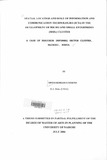| dc.description.abstract | lnformation exchange triggers dynamism that m turn causes mobilization and
activity within the society in general.
lnformation and Communication Technologies (lCTs) has become a vital and
integral component of both socio-economic development and infrastructure of any
country. Thus underscoring the need for its cost-effective availability in every sector
of development.
lnformation and Communications Technologies (ICTs), such as the World Wide
"Web, e-mail, telephones, fax and satellites are revolutionizing the way in which
societies interact, conduct their businesses, compete in international markets and set
their economic and human development agendas. ICTs can enable societies to
produce, access, adapt and apply greater amounts of information, more rapidly and
at reduced costs, and offer enormous opportunities for enhancing business
productivity and economic activity. ICTs can also contribute toward increasing
social participation, competing in the global market place and removing barriers to
modernization, making poor populations fuller agents in the sustainable
developmental process. However, with the rapid introduction of these technologies
m our economy, the gap between formal and informal sector is widening and
alarming.
Micro and Small Enterprises (MSEs) also known as informal sector contribute
significantly to employment thus providing families with income and it also creates
an enabling environment for the purchase of essential goods and services. The study
recognizes t he difficulty this sector has, especially on direct access to ICTs. The . number of ICTs services provided for them is not enough and the few which are
available are haphazardly located, hence poorly utilised or neglected. In line with
this argument the study endeavour to take Kariokor cluster as a case of illustration of
how location of ICTs .affects utilisation of the ICTs and on the same note look at the
potential of ICTs as a business development tool and as a solution to distance
barrier. | en |

